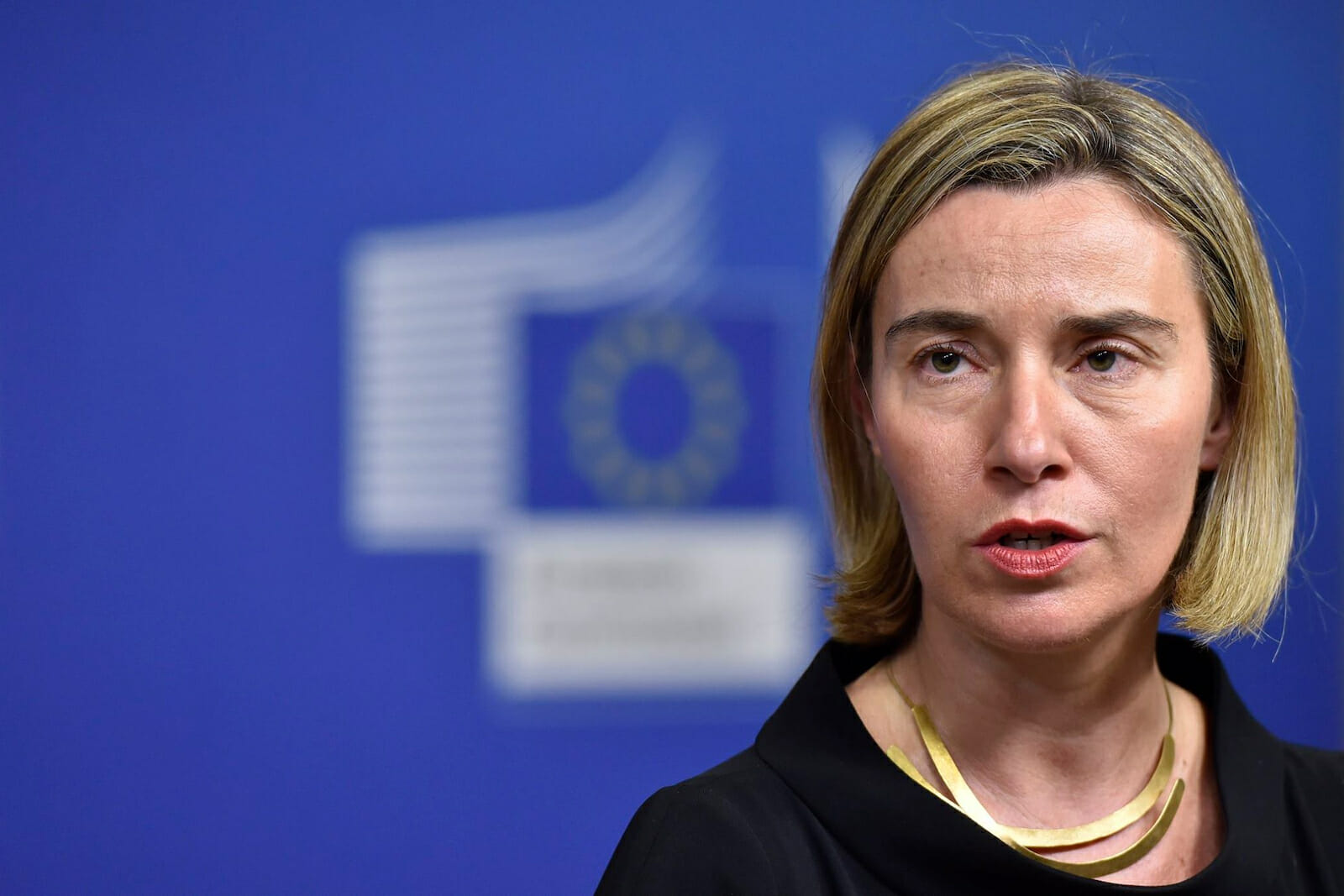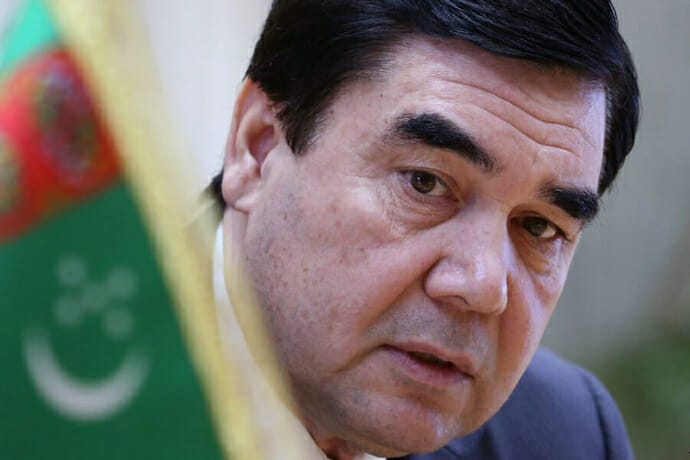
UK and EU Condemned for ‘Cosying up’ to Former Soviet State Accused of Forced Labour and Torture
On 6 July, the EU’s outgoing High Representative for Foreign Affairs, Federica Mogherini, began her much-vaunted Central Asia tour by visiting the Turkmen capital, Ashgabat.
The EU’s chief diplomat’s visit is intended to herald “increasing co-operation between our country and the European Union,” with the EU’s presence in Ashgabat upgraded to “fully fledged from a diplomatic point of view.”
However, the attempt to reach out to the former Soviet republic is deeply controversial.
Rachel Denber of Human Rights Watch called on Mogherini to put greater pressure on Ashgabat over its unaddressed human rights and civil liberties abuses. There were plenty of options for Mogherini to choose from. The widespread detention of journalists, critics, and protestors on trumped-up charges, the routine use of torture in Turkmen prisons, and Turkmenistan’s total lack of press freedom. But the EU’s chief ambassador did not feel the need to raise a voice on any of them.
Human Rights Watch’s criticism of the EU’s cosying up to Ashgabat coincides with the launch this week of an extensive report by a respected UK-based think tank, the Foreign Policy Centre (FPC).
“Spotlight on Turkmenistan” is a damning investigation, throwing light on a shamelessly unreformed police state on the brink of economic meltdown. It paints a bleak picture of ineradicable political corruption, a collapsing currency, spiraling indebtedness, flagrant disregard for the rights of citizens, and a disdain for the assets of investors. Astonishingly, the report concludes that the country has moved backwards on most metrics since achieving its independence.
The report calls into question the overtures to Turkmenistan made by the UK, the EU, and the international community more generally. It appeals to the regime to notify families about the status of disappeared detainees, to release political prisoners and journalists, to abandon the use of torture and to end forced labour in its cotton harvest. Additionally, UN Special Rapporteurs should be allowed access. Furthermore, the FPC makes formal recommendations to Western countries that are currently seeking deeper engagement.
The FPC lays out firm criteria that it deems necessary if the development of EU-Turkmen relations is to be conducted ethically. Notably, it says the EU should adopt the European Parliament’s human rights benchmarks and that the European Bank for Reconstruction and Development (EBRD) should make its lending contingent upon human rights reform. It calls for the creation of an Independent Labour Organisation to tackle cotton slavery and urges that international trade promotion efforts like the UK’s Turkmen-UK Trade & Investment Council (TUKTIC) should be reconsidered.

The evidence gathered by the report is weighty and wide-ranging. From an extensive inquiry into abuses such as arbitrary arrest, mistreatment of prisoners and the use of forced labour, to a fully-fledged diagnosis of Turkmenistan’s economic woes including mistreatment of investors, the report represents the most thorough indictment to date of this rogue regime.
Turkmenistan’s currency, the manat, has collapsed in real terms, falling to 29 against the dollar in 2018. Ashgabat has responded to the recent economic slowdown by imposing capital controls as they seek to control the movement of currency. This is due to a reduction in foreign currency revenue from gas export contracts, and a general mismanagement of the banking sector. These restrictions directly affect investors seeking to repatriate profits or move jurisdiction.
The economy is entirely reliant on natural gas (it possesses 9.9% of the world’s total reserves) and cotton (it is the world’s ninth-largest producer). Its economy is “heavily centralised and state-dominated,” with a serious lack of managerial independence even in the private sector.
Corrupt payments to officials are a necessary precondition of almost any meaningful business activity, with companies seeking contracts having to funnel vast sums through unofficial channels to state bureaucrats. Transparency International ranks Turkmenistan 161st out of 180 countries surveyed for overall levels of corruption. While the World Bank records a growth rate of 6.2%, this falls below even the official inflation rate (approximately 9.4%), with the independent Cato Institute projecting a figure as high as an eye-watering 294%.
Speculative foreign investors should take heed of the serious warnings issued by the report. It describes FDI as “fraught with risk,” citing shocking examples of investor abuse. The Cakiroglu Group, for example, reportedly left Turkmenistan after 5 years of non-payment of government contracts at a cost of several million dollars. The report also highlights the fate of Russian telecoms company MTS, which reportedly suffered millions of dollars’ worth of losses after having its license to operate within state infrastructure suddenly and arbitrarily revoked.
The UK government itself states that “the law does not adequately protect contracts, and can be changed by decree or ignored with impunity by vested interests.” It is no surprise that numerous companies have appealed for arbitration pending before the International Centre for Settlement of Investment Disputes (ICSID).
Government impecuniosity and property right violations aside, potential investors run a serious risk of reputational harm by means of association with the country’s appalling human rights record. It is ranked 119th out of 129 in the Bertelsmann Transformation Index and 204th out of 210 by Freedom House for its record in this area. The British Foreign & Commonwealth Office has identified the regime as a priority country for humanitarian reform, indicating that Turkmenistan remains the most repressive of the Central Asian republics.
There are serious allegations from respected NGOs including the Cotton Campaign and Anti-Slavery International regarding the use of forced labour, including the use of children. The Responsible Sourcing Network launched a boycott of Turkmenistan in June 2018 in an attempt to increase pressure on the regime and draw the attention of Western governments to its behaviour. By engaging with Turkmenistan, investors run a high risk of exposure to deeply unethical supply chains and hence the real possibility of scandal.
Turkmenistan has refused to undergo meaningful structural reform since its independence in 1991, and it retains all the hallmarks of a corrupt dictatorship. State vanity projects such as the enormous martial arts centre in Ashgabat, gilded equestrian statues of President Gurbanguly Berdimuhamedow, and stately marble facades mask a darker reality of brutal repression of dissent and a stifled command economy.
So far, Western countries have taken a laissez-faire approach towards this underreported police state, offering the hand of economic partnership without imposing serious conditions of reform. In the light of these revelations, and without any signal from Ashgabat of willingness to entertain serious social or economic change, Western actors should be significantly more cautious in their willingness to embrace Turkmenistan into the international community.
